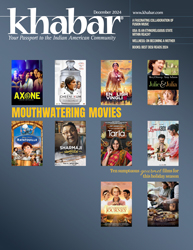English, the Hinglish Way
If keeping Indian languages alive is the issue in America, in India it is the vernacular that is transforming the English language ? into an avatar that few would have foreseen.
By SIDDHARTH SRIVASTAVA
Thanks to the legacy of 200-years of British rule, coupled with India's emergence in modern times as the undisputed leader in global IT services as well as call center and other backend support services, the use and prominence of the English language in contemporary India has reached its zenith.
Predictably though, influenced by the regional vernacular, the English spoken in India is a breed of its own. Often referred to as Hinglish (a mix of Hindi and English), Indian English is a metamorphosed entity that often appears all its own.
Examples of hybrid words and even vernacular words that have now found their way in spoken and even written English in India, are countless. The latest edition of Collins English Dictionary offers some examples. Several distinctly Hindi words that form the vocabulary of a large section of English-speaking Indians have been incorporated in this dictionary. They include aunti- ji and uncle- ji, freshie (a new immigrant), filmi (dramatic), gora (Caucasian), kutta (dog) and kutti (bitch), haramzada and haramzadi (bastards or obnoxious/despicable) and yaar (friend). In a statement the Dictionary has officially acknowledged the role of Hinglish in the evolution of English.
Last year's edition of the 94-year-old Concise Oxford Dictionary, considered the world's favorite word bank, turned eclectic and incorporated several Indianisms. Adda (local joint), langar (community eatery) and dicky (car) have become bona fide 'English' words, adding to the Indian storehouse, which also includes Hindutva, history-sheeter and others. Many words of daily use in English are of Indian origin, including words like shampoo, bangle, bungalow, jungle, mantra, pundit and cot.
Collin's has taken the process further. Other words include badmash (bad person), changa (fine), chaddie (underwear), desi (native) and machi chips (Hinglish for the very English dish, fish n' chips). These words, reflecting the Punjabi-flavored English spoken by many South Asians in Britain, denote a meeting of cultures. Commonly used words in popular Asian soaps such as "The Kumars at Number 42" and "Silver Street," which are watched by mainstream audiences, have been picked up. According to a statement by Collins, "the inclusion of Hinglish words in the Dictionary marks an exciting development and a new phase of borrowing by English."
"The beauty of English is that from the earliest times it has been able to incorporate and adapt words from other languages,'' noted editor- in-chief Jeremy Butterfield. "Already, we probably can't get through the day without using several words derived from Indian languages. In the long run, we can expect Hinglish to influence English in many fields, in the same way that Latin and French have over several centuries."
Indeed, parents and schools across the world ? including the ones in China, Germany and other non-English speaking European nations ? want their kids to learn English, the only global instrument of communication. As cross-cultural exchanges happen in a connected world, language remains in focus. There are reports that Indian call centers are advising their customer care executives to speak the native way rather than accented English to appeal to Western clients. The focus is on clarity and getting the problem solved rather than image to gain acceptance. This is in the wake of individual vigilantism due to job losses with racist and abusive hate calls aimed at harassing Indian call center operators.
According to speech-voice consultant Sabira Merchant, "Indians have excellent control over written English, yet when it comes to pronunciation, we do not always sound right. The problem is while Americans think in English, we think in our mother tongue and translate it while speaking. As a nation we do speak good English. That is why most Indians score easily over people of other nationalities. But it will still take time for Indians to speak with a polished accent and fluency."
Following the outsourcing wave, Bangalore, India's Silicon Valley, has emerged as only the second modern city in the world to be turned into a verb after Shanghaied ? a word that broadly means to be forced to do something by fraud or coercion. Getting Shanghaied, in circulation since 1870, has acquired a 21st-century context due to Chinese goods flooding U.S. markets.
Getting Bangalored, yet to find mention in a dictionary, reflects the sentiments of those who have been laid off in the U.S. because their jobs moved to Bangalore. "I am a software developer who is about to be Bangalored. Fine. I am not going to pout about it," a participant wrote in an online forum.
Indeed, as Hinglish gains currency, Indians only try to be better at the original. The news from America is good as well. For instance, Anurag Kashyap, a 13-year-old from California, won the 78th Scripps Howard national spelling bee competition. In fact, the four finalists this year were Indian-Americans. The national spelling bee, a well-established American tradition, has 273 finalists, aged 9 to 14, who compete at a plush Washington hotel. A good number every year are children of Indian immigrants, and their success rate shows an eagerness among them to master the English language.
Enjoyed reading Khabar magazine? Subscribe to Khabar and get a full digital copy of this Indian-American community magazine.
blog comments powered by Disqus











